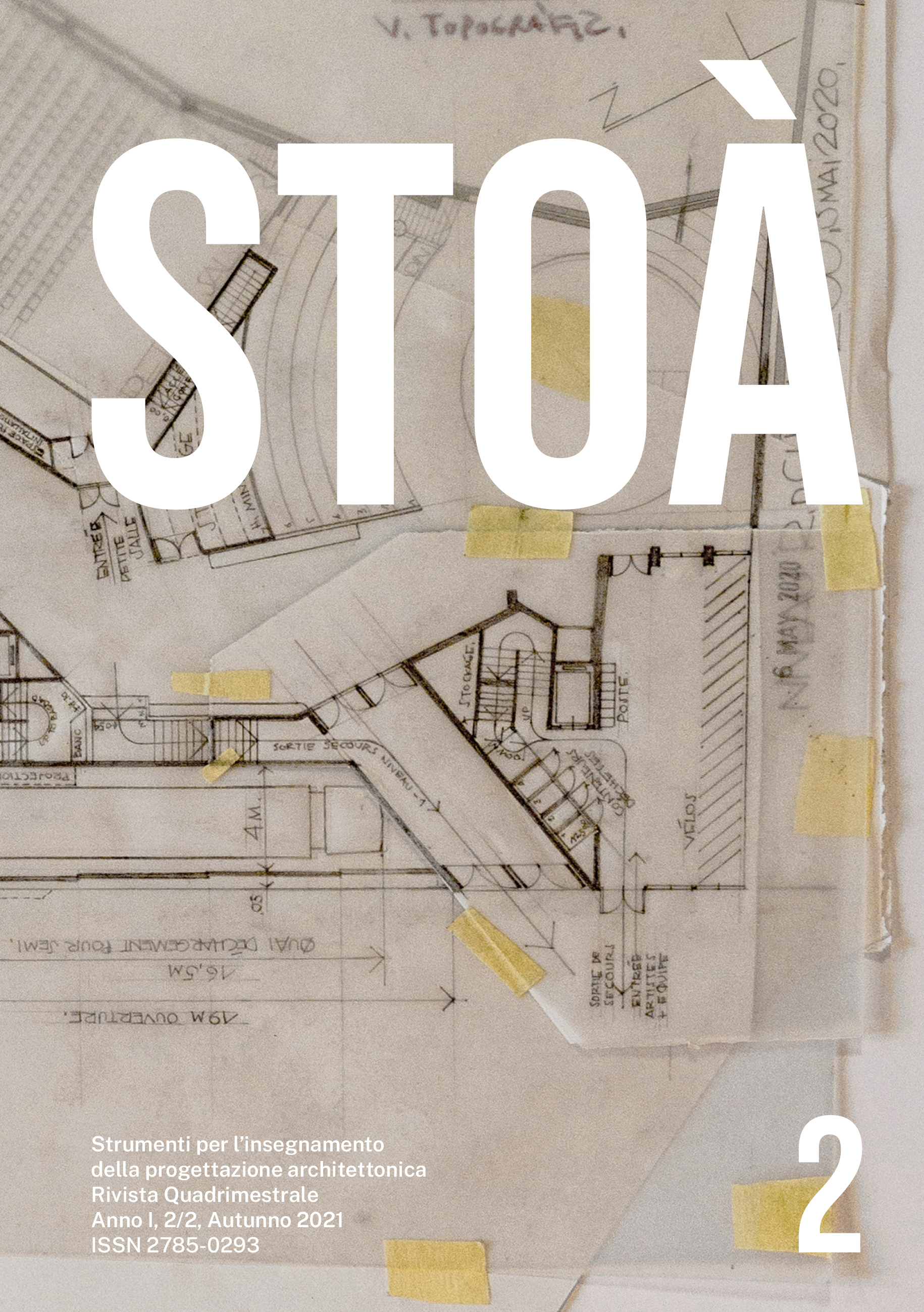︎︎︎ Issue 02
STOÀ 02 [Disegni]
Anno I, 2/2, Autunno 2021
ISSN 2785-0293
ISBN 978-88-32072-14-3
Il disegno è il più antico e frequentato strumento pedagogico per il progetto architettonico. «Sono le mani ad imporre una forma, un contorno, e, nella scrittura, uno stile» così Henri Focillon inizia il suo Elogio della mano, una mano che pensa. Il secondo volume di STOÀ si configura come un tentativo di tratteggiare alcuni aspetti teorici, metodologici e processuali per riflettere, mettendone al centro della discussione alcune caratteristiche peculiari, sul valore radicale del disegno come strumento didattico. L’interesse specifico proposto è nell’indagare in che maniera e per quali ragioni il disegno venga ancora oggi utilizzato per insegnare progettazione architettonica – nodo problematico non scontato – e, attraverso una perlustrazione di alcune pratiche didattiche attuali, si è cercato di definire un ragionamento intorno ad alcuni presupposti e possibili orizzonti capaci di confermare il disegno come fondamento indispensabile, condensatore, nel suo farsi e darsi, di un sapere teorico e medium di un sapere pratico.
The drawing is one of the most ancient and widely used tools for teaching architecture. «Through his hands, man establishes contact with the austerity of thought. They quarry its rough mass. Upon it they impose form, outline and, in the very act of writing, style». Thus wrote Focillion in his In Praise of Hands – hands that think, one could add. STOÀ’s second issue intends to outline some theoretical, methodological and processual aspects to confirm, by placing its distinctive characteristics at the centre of the discussion, the radical value of drawing as a pedagogical tool. The focus of STOÀ [Drawings] is to investigate the ways and reasons for which architectural design continues to be taught through drawing as still relevant questions, and through an in-depth survey of some specific current didactic experiences, the reflections within this issue gather around drawing’s premises and its possible horizons to confirm its fundamental role as a condenser of theoretical knowledge and medium of practical knowledge.
︎︎︎Abstracts
︎︎︎Get a copy
︎︎︎Issues
︎︎︎Disegni a cura di/edited by Alberto Calderoni, Carlo Gandolfi, Jacopo Leveratto, Antonio Nitti con il contributo di/with the support of Fabrizio Ballabio, Tommaso Brighenti.
︎︎︎ A portata di mano
︎︎︎ Elogio della matita
Posizioni
︎︎︎ On Drawing by Hand
Eva Prats
︎︎︎ Drawings in Architectural Education
Alexander Brodsky, Bogdan Peric
︎︎︎ Drawing upon Painting
Adam Jasper
Ideario
︎︎︎John Hejduk, Andrei Şerbescu, Jiehui Avery Chen, DAS – Drawing Architecture Studio, Vardehaugen, Crystal Torres/Piergianna Mazzocca, Raumlabor, KOSMOS Architects, Cedric Price
a cura di Vincenzo d’Abramo e Nicoletta Faccitondo
Corrispondenze
︎︎︎ A Return Ticket to Academia
Angela Gigliotti, Fabio Gigone
︎︎︎ Seeing, Drawing, Making
Philip Christou
︎︎︎ Critical Sequential Drawing
Jo Van Den Berghe
︎︎︎ Matita rossa
João Nunes, Angela Palmitessa
︎︎︎ (Re)Casting the Shadow
Gregorio Astengo
Rapporti
︎︎︎ La prassi del ridisegno nell’Atelier Walter Angonese
Tommaso Fantini
︎︎︎(Re)Drawing the Housing Commons
Ioanna Piniara
︎︎︎Survey Drawings, Drawing Projects
Kornel Tomasz Lewicki, Marina Montresor
︎︎︎Teaching Freehand Drawing
Rafael Sousa Santos, Clara Pimenta do Vale, Barbara Bogoni, Poul Henning Kirkegaard
Tracce
︎︎︎Sguardi obliqui, tracce parallele
Marianna Ascolese
︎︎︎Disegni italiani. Interviste a Orsina Simona Pierini, Valter Scelsi, Carlo Moccia, Nicola Russi, Lamberto Amistadi, Gundula Rakowitz, Emanuele Fidone, Giuseppina Scavuzzo, Elvio Manganaro, Luigi Franciosini
a cura di Marianna Ascolese e Tiziano De Venuto
︎︎︎La mente fa la mano, la mano fa la mente
Tiziano De Venuto

